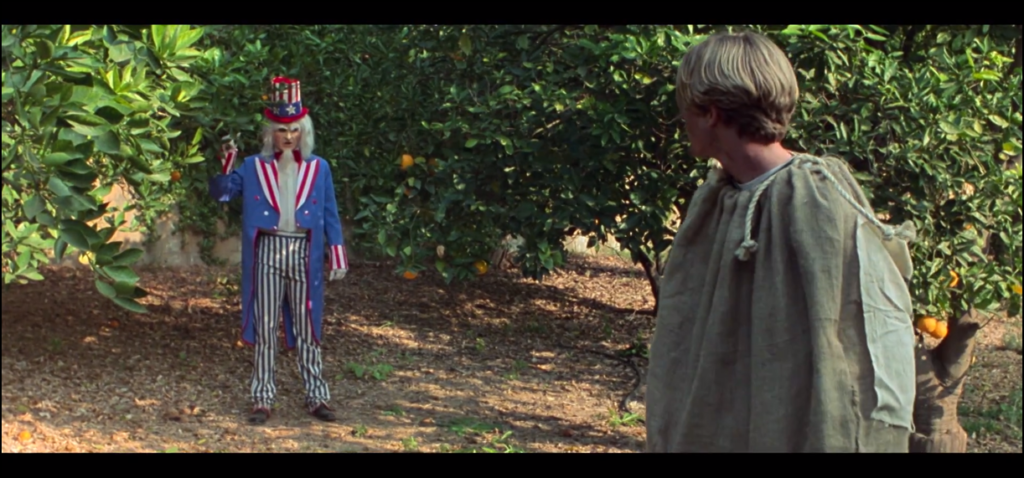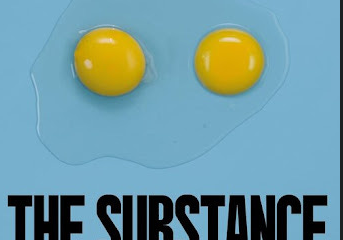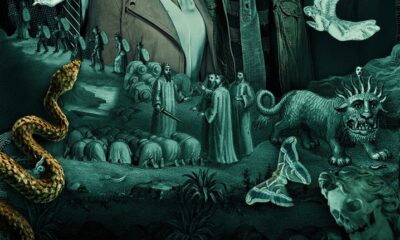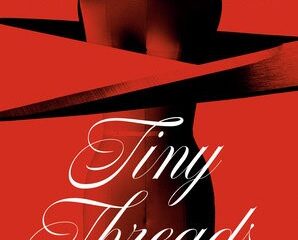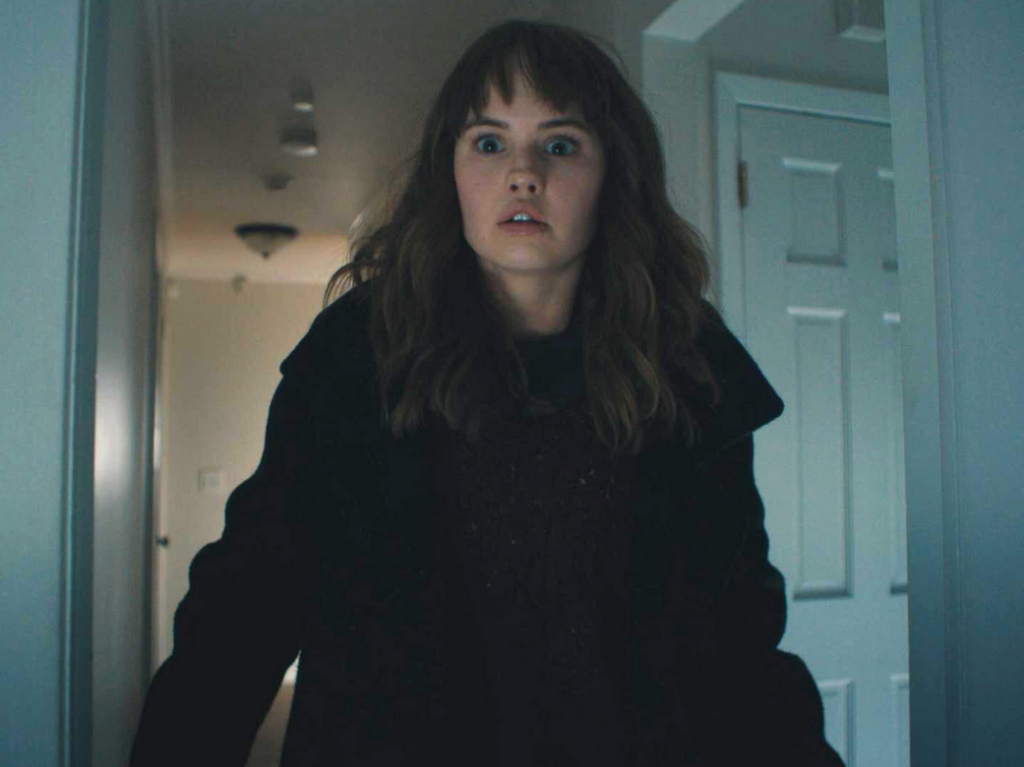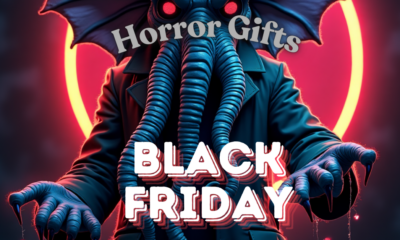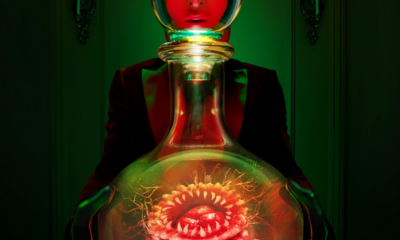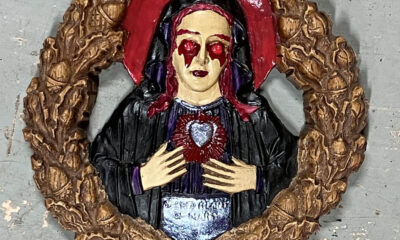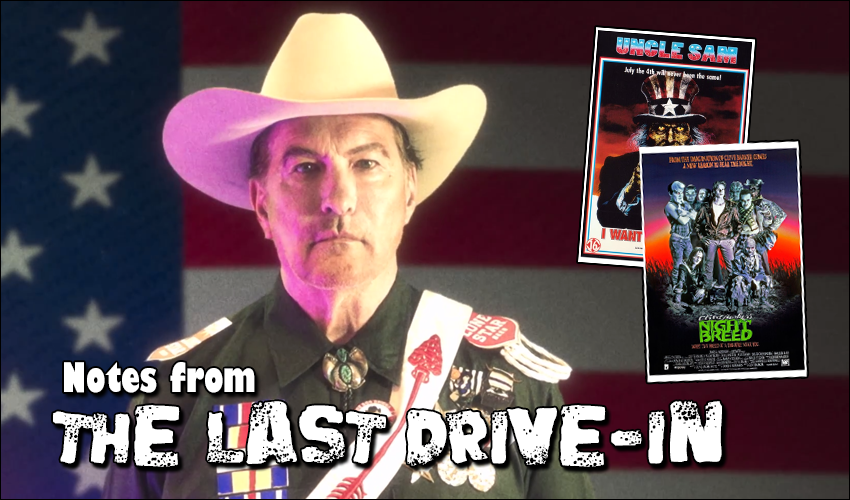
Notes from the Last Drive-In: S4E10 – ‘Uncle Sam’ and ‘Nightbreed’
More Videos
Published
2 years agoon
We are back to the drive-in for a final night until later this fall with S4E10, featuring Uncle Sam (1996) and Nightbreed (1990). How does this finale stack up with the rest of the season, and is the July 4th theme something that works, or is this another example of the theming mismatch that has plagued this season?
Let’s see what Shudder had in store for us on July 1st, 2022.
Hey all, it is @hpkomic, recovered from COVID just in time to live tweet #thelastdrivein tonight.
It has been a great season and I am excited a new season is on the way. See ya as the show starts!@therealjoebob @kinky_horror @shudder #mutantfam pic.twitter.com/al5dDNC2qF— Haunted MTL 🏳️🌈 (@HauntedMTL) July 2, 2022
Uncle Sam (1996)
Specific names carry weight in horror, especially among the Drive-In audience. Uncle Sam, a 1996 black comedy slasher, features two names: director William Lustig and writer Larry Cohen. Lustig and Cohen should be familiar to fans of The Last Drive-In from Maniac, Maniac Cop, The Stuff, and Q The Winged Serpent – all films spotlighted on the show before. But those are not the only names attached to the film worth noticing, either. This low-budget slasher has some iconic character actors, including Isaac Hayes, William Smith, David Fralick, Bo Hopkins, P.J. Soles, and Robert Forster. Add in Troma-cinematographer James Lebovitz and frequent Sam Raimi editor Bob Murawski, and you have one hell of an assembly of talent.
It’s a shame, though, that the film is so mild.
Gee, what sort of psychopaths might wrap themselves in the flag? Hm?Hmm??#thelastdrivein @therealjoebob @kinky_horror @shudder #mutantfam— Haunted MTL 🏳️🌈 (@HauntedMTL) July 2, 2022
Uncle Sam is a Gulf War-era story about the friendly-fire death of Master Sergeant Sam Harper (David Fralick), whose charred and re-animated body goes on a murder spree starting in Kuwait and taking him to his down of Twin Rivers during the yearly Independence Day celebration. The arrival of Sam’s coffin to his widow, Louise (Anne Tremko), estranged sister, Sally (Leslie Neale), and idolizing nephew, Jody (Christopher Ogden), begins to open up old wounds in the family. Thankfully, veteran Jed Crowley (Isaac Hayes) is there to help steer young Jody and aid in the fight as Sam’s sinister return takes Twin Rivers by storm.
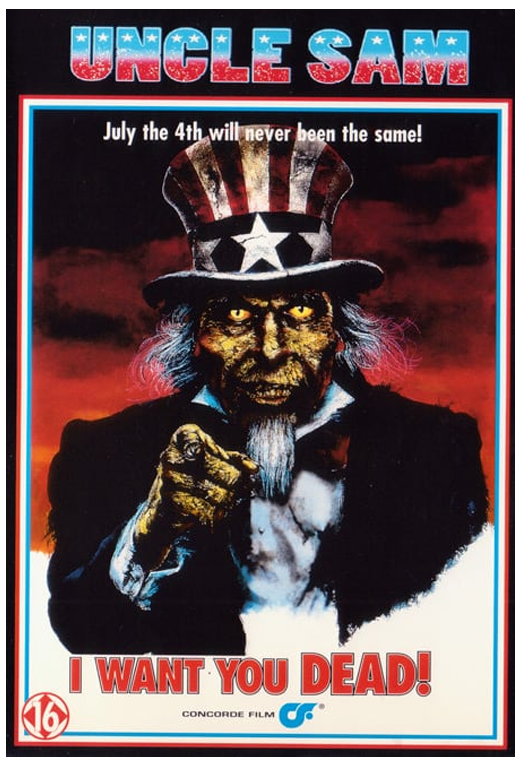
The movie is not terrible, but it is also a far cry from previous Lustig and Cohen collaborations. The film tries to evoke the spirit of the 1980s slasher in the mid-1990s, but by playing fast, loose, and straight, the film feels like a pale imitation of more iconic movies. The holiday theme, a costumed killer, and a strange handful of dispatching methods that evoke the one-upmanship of other slasher series – all result in a slasher that feels pretty bland, especially when the genre would be re-invigorated and mastered by Wes Craven’s Scream, only a month or two later.
Slashers have never been high art, except for one or two films. Often it is a genre that makes strange logical leaps and constructs bizarre set pieces to find a novel way to carry a no-importance character to establish menace and earn a laugh and a thrill. The biggest problem with Uncle Sam is that, except for a kill or two, most of the murders are weak affairs. Sometimes the film even undercuts the inherent build-up of tension, suggesting one form of murder only to abandon it and go with something else to little effect. It doesn’t help that for a black comedy; the film is largely devoid of significant laughs – though one sequence involving a chase on stilts is peak absurdist slasher humor. If the misdirections in what the film sets up are on purpose, as a kind of joke or commentary, they primarily do not land.
The performances are fine. The veteran actors are suitably game with the premise and are why the film works. Child actors can be tricky to assess, and sometimes nuances in characters are hard to see play out: If Christopher Ogden was playing the character of Jody as an unstable kid going down a dark, violent path, he did well. If that was not the intent, then perhaps not. The film doesn’t provide enough depth for us to care one way or another. The best performance comes from Isaac Hayes, who has a semblance of an arc and gets to deliver some of the best lines of the film. His character has a sense of nuance and is generally charismatic – the role model Jody needs and the one who sets him straight.
I don’t necessarily want to belabor that I wasn’t a huge fan of the film. I think the editing, direction, and cinematography were solid. I especially loved the patriotic montage opening. I think the film has a good set-up, but I also feel that Cohen could have done a little more work to deliver something more substantial.
Joe Bob-servations on Uncle Sam
Joe Bob’s take on Uncle Sam was pretty fair regarding enjoying the movie but recognizing the flaws. There were several moments during the host segments where he pointed out some of the puzzling and somewhat lazy approaches the film took to sets-ups and motivation. He pointed out that the film is essentially a riff on the earlier Maniac Cop series.
Of course, the insights on the production, cast, and crew were excellent. But perhaps the most entertaining reflection of the evening was Joe Bob discussing his time spent with Robert Forster. Forster’s career at the time was on a downturn, just before Jackie Brown and Joe Bob’s own career path pre-Shudder was quite similar. It was a touching tribute to the departed actor with a bit of reflection.
Final Thoughts on Uncle Sam
Uncle Sam is a middling-to-fair entry in the late slasher canon that plays a little too straight with the tropes and trends to its detriment. With the amount of Drive-In talent attached, fans of the show may be expecting more than this film can deliver. In comparison and around the same time, Jack Frost presents a much stronger example of what Uncle Sam may have been aiming for.
Joe Bob Briggs gave Uncle Sam 2 and 1/2 out of 4 Stars. I can’t help but give Uncle Sam 2 and 1/2 out of 5 Cthulhus.

Best Line: “Don’t be afraid, it’s only friendly fire.” – Sam
Nightbreed (1990)
Now Nightbreed (1990) is one hell of a selection to end a season on. This film has had a wild journey from a disappointing follow-up to Hellraiser to a much-beloved cult favorite that reflects a promising film career cut short. The film is a dark horror fantasy written and directed by Clive Barker, adapted from his 1988 novella Cabal. This film was the second of the three total films directed by Clive Barker, the last being 1995’s Lord of Illusions. Nightbreed re-unites Barker with cinematographer Robin Vidgeon, who handled Hellraiser, and features two editors, Mark Goldblatt and Richard Marden; the latter left the film in protest due to studio interference. The film also features a score by Danny Elfman.
The movie stars Craig Sheffer, Anne Bobby, David Cronenberg (yes, that Cronenberg), Hugh Quarshie, and Doug Bradley.
Take me down to Midian City where the bloods flows freely and the ghouls are pretty.#thelastdrivein @therealjoebob @kinky_horror @shudder #mutantfam— Haunted MTL 🏳️🌈 (@HauntedMTL) July 2, 2022
Nightbreed is set in Calgary and follows Aaron Boone (Craig Sheffer), a man consumed by dreams of a city of monsters called Midian. His girlfriend, Lori (Anne Bobby), asks him to visit a psychotherapist, Decker (David Cronenberg), who is secretly a serial killer who seeks to pin his crimes on Boone. Decker’s scheme is derailed as an injured Boone encounters a man named Narcisse (Hugh Ross), who also knows something of Midian. Soon, Boone finds himself on a journey to Midian, where he may share a vital connection with the monstrous residents, while Decker and Lori seek him out.
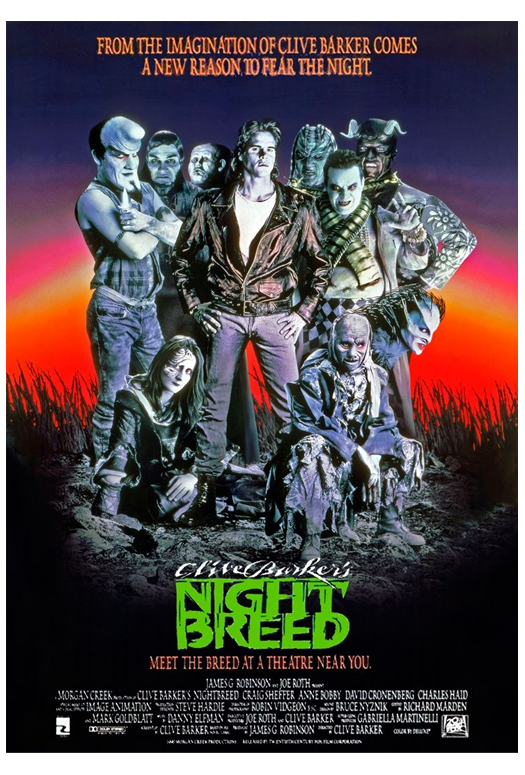
Nightbreed, this restored version, at least, is one of those rare horror epics where the scope is so much bigger than a madman hacking up teens. There is a real sense of texture in the setting and a sense that there is so much more story to tell. The theatrical cut of the film featured a bit of that, but it took the ardent desire of fans to restore the film as closely to Barker’s intent to make these elements clear. The film’s story is good, but it does suffer from the feeling of being the first act of a longer, more complicated story, the resolution being a tease for an adventure ahead that we’ll likely never see. This ultimately leaves the film feeling a little empty in that regard.
Simultaneously, though, there is also so much going on in the film that can feel a bit crowded, and significant moments come off as more confusing or puzzling rather than beats in a larger conflict. The introduction of the Berserkers in the film’s third act, coupled with the motivations of the deity Baphomet, is an excellent example of this. There is something more to it, but the film just does not have the run time to devote to developing these angles. So too with the various forces that converge on Midian. The local police, almost sweeping in as the film’s true villains, are reduced to a stock and abusive militarized force without a chance to grapple with the implication of Midian and why its presence is so upsetting beyond “they’re different!”
If there were ever a story needing a streaming series adaptation, perhaps Nightbreed is the best choice.
I’ve spent a lot of time here discussing the film’s story, but that is because this film has something genuinely incredible that another take can bring to the surface. The rest of the elements in the movie are excellent, however. But they are a lot like a fresh coat of paint on a crumbling wall: the issues at the story’s heart persist, despite the technical and performance achievements. The film looks fantastic. The rich, gothic set designs, elaborate matte paintings, and detailed sets create an epic underground look. The Danny Elfman score is also equally epic.
The acting is excellent across the board. Craig Sheffer and Anne Bobby are effective as somewhat doomed lovers but could have had far more to sink their teeth into. What they do have works, however. However, the critical performance in all of this is David Cronenberg playing a sadistic masked killer. While his role would ultimately confuse the studio into thinking Nightbreed was a slasher, we can partially forgive them as Cronenberg is magnetic. Between his sinister plotting, disaffected personality, and masked presence, he is one of the more unique slashers introduced to film. It is enjoyable to watch his character change his goals and embrace the absurdity of the presence of a city of monsters under a graveyard. Cronenberg’s Dr. Decker is a chaos agent.
Joe Bob-servations on Nightbreed
Joe Bob’s praise of Nightbreed was effusive, especially given his admittedly cold reception of the film upon release. The host segments were a tribute to hardcore fans who loved the strange little monster film and recognized there was more to it. His relaying of the story was a lovely tribute to one of the more positive elements of fandom. These days we focus so much on toxic fandoms that it is such a breath of fresh air to cover a story of a fandom doing right by a creator.
The night’s final segment featured Joe Bob doing a riff on the infamous speech from Patton (1970) as a Lone Star General. It was a fun and inspiring choice to close out the season and the July 4th-themed evening. He may have worn his heart on his sleeves, but his shoulders had beer packaging cardboard epaulets.
Final Thoughts on Nightbreed
Nightbreed is an excellent film despite some significant issues. There is so much lost potential that I can’t help but appreciate what it was going for. While it doesn’t stick to the landing, the execution is strong, and there are some iconic elements worth praising. I hope that one day someone realizes the potential of Nightbreed and lets Clive Barker return to it to achieve what he wanted. It is not a perfect film, but it is a tantalizing glimpse at a missed opportunity.
Joe Bob Briggs gave Nightbreed 4 out of 4 Stars. I think that was a reasonable assessment as it featured blood, breasts, and beasts – the drive-in essentials. The man said he would give it 5 stars if he could. As much as I adore the movie, I do think it has some critical flaws. I give Nightbreed 4 1/2 of out 5 Cthulhus.

Best Line: “You are a freak and a cannibal and you’ve come to the wrong town.” – Captain Eigerman
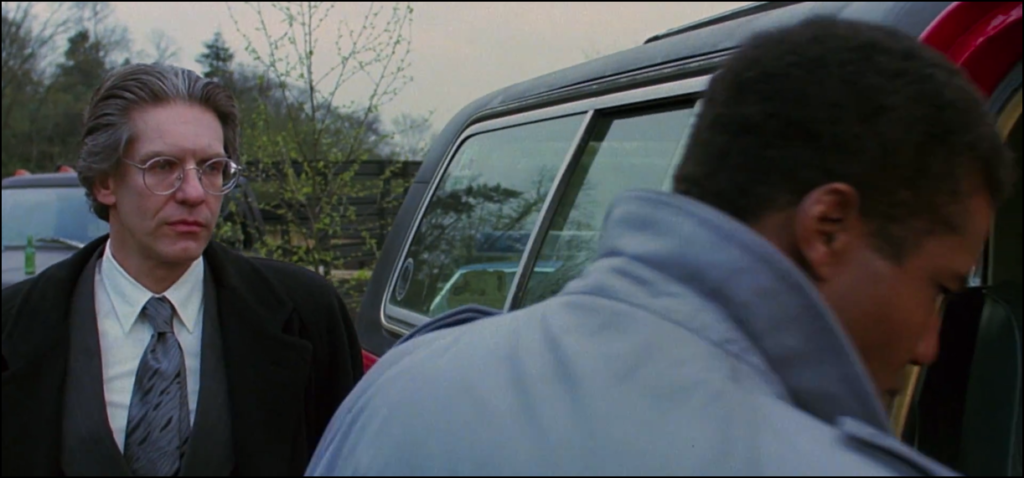
Haunted MTL Drive-In Totals
Shudder has provided the official drive-in totals on their Twitter account.
"Gratuitous P.J. Soles" is better than no P.J Soles. #TheLastDriveIn pic.twitter.com/cFypesDU34— Shudder (@Shudder) July 2, 2022 The highest praise a movie can get. #TheLastDriveIn pic.twitter.com/JMidKTBDXY— Shudder (@Shudder) July 2, 2022
As for our own totals for the season finale, we have:
- 1 Wooden Leg
- 2 Chart-driven Rants
- 2 Instances of ‘Thee-ate-er’
- 33 Houses in a Legal Entanglement
- 200+ Monsters
- 500 Boxes of 35 MM Film Strips
- Gratuitous Flaggery
- Gratuitous Doug Bradley Brief Appearance
- Blind Groping
- Self Scalping
- Car Exploding
- Absent Father Fu
- Chart Fu
- Tomb Defacing Fu
- Montage Fu
- Spray Can Fu
- Cronenberg Rolls
- Training Video
- Patriotic Jokes
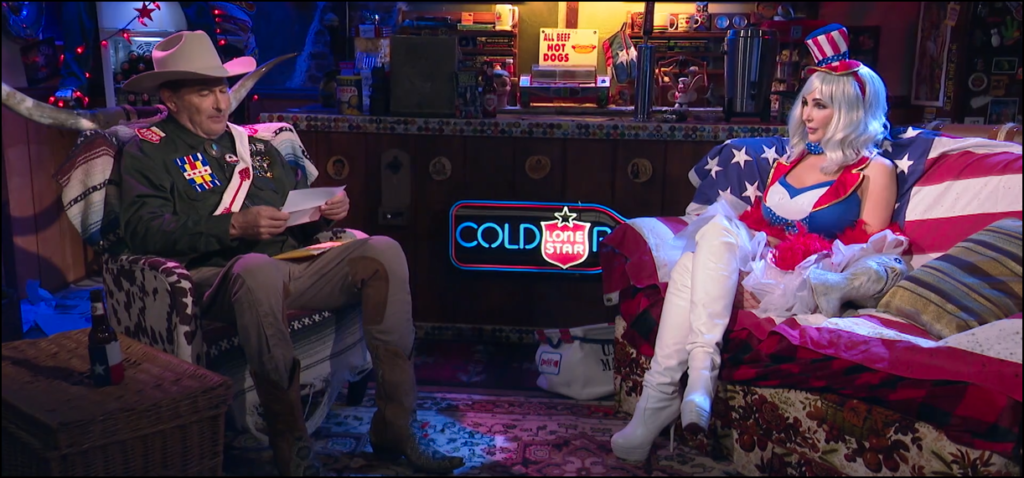
Episode Score for The Last Drive-In S4E10 – Uncle Sam and Nightbreed
Again, we have a situation where the night’s theme was somewhat hollow, and only one of the films really hit the mark. I suppose there is any number of logical leaps and connections one could make to connect Nightbreed to the stated them, but that is far more critical work than should be necessary. So as has been an issue with season 4, the stated theme for the evening just doesn’t work. That is okay, though. It becomes less of a problem when the movie pairing is stronger, and though Uncle Sam fits the July 4th theme, Nightbreed was the night’s highlight.
Overall, season 4 was quite strong with the movie selection. It featured perhaps the most diverse array of movies with some wild swings in pairings since season 1. While I wasn’t a fan of tying movies to explicitly stated themes, they worked when they worked. Everything else, however, was excellent. I appreciated the rapport between Joe Bob and Darcy this season, and I enjoy the show taking risks by stitching music videos and skits into the fabric of the evenings. The show is still one of the best things Shudder has ever done, and with the recent announcement of season 5, it should continue to be.
I give this season finale of The Last Drive-In with Joe Bob Briggs four out of five Cthulhus.

And that is it for us here at Haunted MTL for The Last Drive-In. We’ll keep readers posted on announcements and news as it develops regarding future seasons and specials. We’ll also return to live-tweet the shows as well.
Joe Bob should tweet a joke a day during the off-season.#thelastdrivein @therealjoebob @kinky_horror @shudder #mutantfam— Haunted MTL 🏳️🌈 (@HauntedMTL) July 2, 2022
Sponsored Link
Want more Clive Barker in your life? Why not read Cabal, the novella that inspired the movie Nightbreed? Use our sponsored link to snag a paperback and help support Haunted MTL.
David Davis is a writer, cartoonist, and educator in Southern California with an M.A. in literature and writing studies.

You may like
Movies n TV
Low point or a daring experiment? Halloween VI (1995) Review
Published
2 days agoon
November 22, 2024
To a lot of fans, this is the film that killed the franchise. It says a lot that the next installment is yet another retcon. Halloween VI: The Curse of Michael Myers attempts to explain Michael’s unrelenting evil, which lead to mixed opinions from longtime fans. There are two cuts of the film, theatrical vs producer’s. For a lot of people, the latter is the only one worth mentioning. Aiming to be as accurate as possible, I will be talking about the producer’s cut. Let’s begin!
Plot
We start Halloween VI with a six-year time jump from part five. Jamie is now barefoot and recently pregnant, running away from Michael as he wants her baby. While she manages to hide the little one away, Michael finally gets his hunger satiated by killing her. The moment is one of the most brutal ways in the franchise up until that point. Rest in peace, Jamie, you held your ground for as long as you could, the sequels were just too relentless.
The movie then cuts to a whole different scene going on. We have a new family living in the Myers house and their youngest child is hearing voices telling him to kill his loved ones. Tommy Lloyd is watching the family, played by none other than Paul Rudd in his first-ever theatrical role. Tommy still carries trauma from the events all those years ago when Laurie Strode was babysitting him. So when he finds Jamie’s baby, his part in the story becomes even more essential.
Dr Loomis also stars in what was Donald Pleasance’s final role before his passing. He and Tommy try to stop Michael once and for all before the cycle can repeat itself. As it turns out, Michael is a victim of a druid cult which makes him want to kill his family members every Halloween. Thorn, the cult in question, thinks they can control Michael and make him do their bidding. This results in catastrophe and Michael goes berzerk and kills all the cult members. Once again, it’s one of the most gruesome montages for the franchise up until that point.
Tommy and Kara are left to face Michael on their own which they manage to do with some corrosive liquid and good luck. However, nothing stays dead in this franchise as it’s soon revealed Michael somehow escaped and this time Dr Loomis might not be so lucky…
Overall thoughts
I would say for me personally Halloween VI definitely ranks somewhere near the bottom. The whole point of Michael is that there is no rhyme or reason to his killings and this film tries to go against that. I am glad the mistake was rectified by the upcoming installment. There were still some good things about it, such as Paul Rudd’s acting that reveals some raw talent as far as I’m concerned, as well as some direction choices and musical score. However, I also think it absolutely deserves all the criticism that it gets.
 (2.5 / 5)
(2.5 / 5)
Movies n TV
American Horror Stories, The Thing Under The Bed
Published
4 days agoon
November 19, 2024
We’ve reached the final episode of American Horror Stories, season three. After the ups and downs of the season, I didn’t know what to expect. I felt that we were due a big finish, Killer Queens. But I feared we were in for a big letdown.
As it turns out, The Thing Under The Bed was neither.
The story
We begin our story with a little girl named Mary, who is scared of something under her bed. She sneaks out of her room, only to be caught by her father and sent back to sleep. And of course, there is something horrible waiting for her under her bed.
This scene cuts away to a woman named Jillian. She has strange dreams, including one about Mary. But her husband, Mark, doesn’t want to hear about it. He’s only interested in a little lovemaking because he wants a baby. Jillian doesn’t, which makes total sense because she’s already married to one. But her irritation with her childish husband goes away when he goes away. And by goes away, I mean he’s sloppily devoured by something vicious under their bed.
What worked
In short, this episode just worked. The acting was professional and believable. The cinematography and lighting work were wonderful, adding spooky effects and startling moments without impairing visibility.
Best of all, the story was solid. There were no plotholes to be found. Our main character, Jillian, was relatable and sympathetic.
This was maybe my favorite part of the story. I thought Jillian was a remarkably sympathetic character. She was dealt a hand she never asked for, having her husband slaughtered in their bedroom. I don’t think she missed him, so much as she was afraid of the legal ramifications of being caught with literal blood on her hands.
Then, when it would have been safest for her to just lay low and save up for a good defense attorney, she instead goes into unlikely hero mode. She does her best to save people, putting herself in legal and physical danger. It’s hard not to root for her.
It’s also a little hard not to root for the antagonist, too. I don’t want to ruin the twist for you, so I’m going to tread lightly here. But it’s great when you have an antagonist who might be off their rocker, but also maybe has a point.
What didn’t work
I can only really think of one complaint with this episode. And that is how frequently one character says the word Chickadee. And if you’ve seen the episode, you know what I am talking about.
I get it, he has a pet name for his daughter. It’s adorable. It’s meant to convey that the two of them have a healthy loving relationship and I get it. We all get it. Blind monks get it. But the fact remains that no parent on Earth calls their kid by their pet name every single time they speak an individual sentence to them. It was just too damn much.
All in all, this was a good episode. It was a classic story, turned on its head, told by professionals from start to finish. And I hope that if there is another season, we see more stories like this one. But after the efforts put into this season at large, I wouldn’t be surprised if this is the last we see of American Horror Stories.

If you’ve watched enough short-form horror anthology shows, you’ll notice that some stories are mainstays. Each show seems to put on the same sort of episodes, with the occasional surprising storyline that we’ve never (or at least rarely) seen before.
Leprechaun was an example of a repeated story—the story of a greedy thief whose punishment far outweighs the crime.
The story
We begin our story in 1841, with a drunk man leaving the bar one late night. He’s distracted by something glowing at the end of the well. When he reaches down for the glowing thing, he falls in. Moments later, he screams.
We then cut to the modern day. The well is still there, and now it’s surrounded by a dying town. In this town lives a young man named Colin. He’s married, his wife is pregnant, and he’s out of work. Like many of his friends.
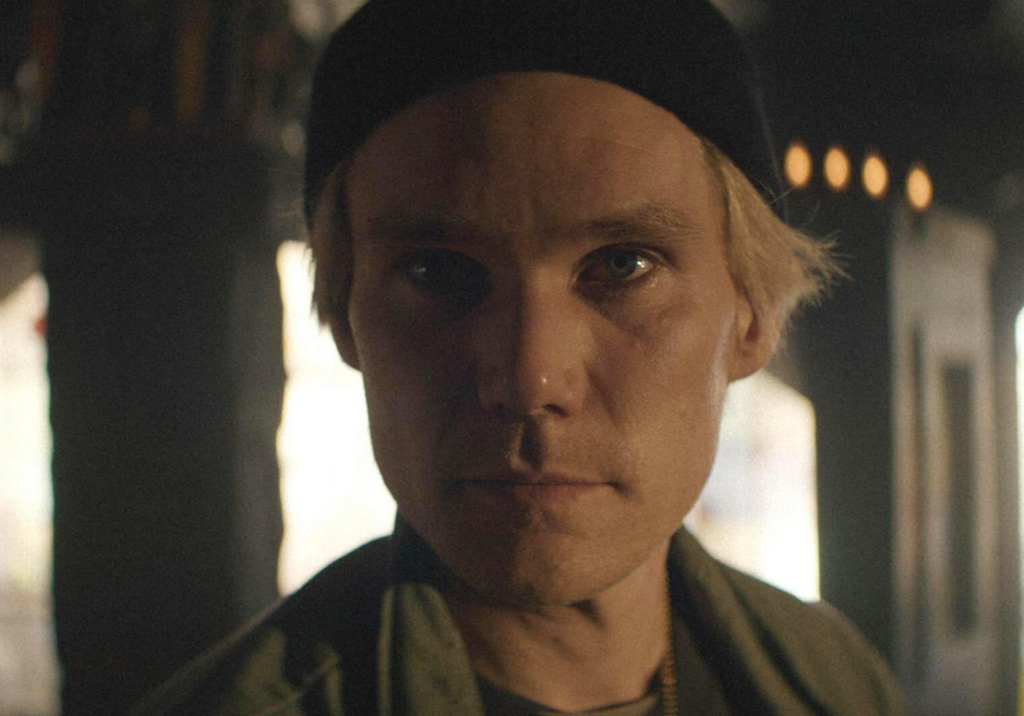
Desperate for cash, Colin and his friends decide to rob a bank. They put together an Equate version of Ocean’s Eleven, and break in one night. But, of course, they find that the gold is nothing more than bait. And the creature waiting for them is something they never expected.
What worked
The first thing I want to point out is how real this episode felt. At least to anyone currently living in the same small town they grew up in. These characters felt like guys I went to school with. Guys I would see at the bar.
I appreciated the real anger and frustration these characters are feeling. Especially Colin. He’s bitter, and maybe he has a right to be. He did exactly what he was supposed to do to succeed. He went to school and invested in his career, and yet now he’s out of work and struggling to support his family. I probably don’t need to tell you how that feels. Because of this, we can all kind of understand why he was tempted to rob a bank.
I also want to talk about the fact that this was, as I said, an often-explored story. That can be a bad thing, but it can also be a good thing. This story is told over and over because it’s a good story. A relatable story. And there’s nothing wrong with that.
What didn’t work
That being said, this version didn’t try to do much to break out of the mold.
Because we have seen this story so many times, most of us could tell the story themselves. I would have expected something new, or some twist. But, in the end, the story didn’t bring anything new to the discussion.
Maybe because of this, the ending left a lot to be desired. Trapped in the basement of the bank, everyone just sort of stares at everyone else, until the thieves give up. And that’s it. The ending wasn’t scary, shocking, or funny. It was just sad, on multiple levels.
Overall, this was an okay story. It was entertaining, if not surprising. I would compare this episode to homemade macaroni and cheese. Everyone’s got their own version, they’re all pretty good, and none of them are exciting.
There’s just one episode left in this season of American Horror Stories. Let’s hope they’ve saved the best for last.

Trending
-
Breaking News2 days ago
🎃 Unleash the Terror: Epic Black Friday 2024 Deals for Horror Fans on Amazon! 🧟♂️
-
Movies n TV4 days ago
American Horror Stories, The Thing Under The Bed
-
Movies n TV6 days ago
American Horror Stories, Leprechaun
-
Original Creations7 days ago
Religious Icons Revisited for the Second Second Coming

